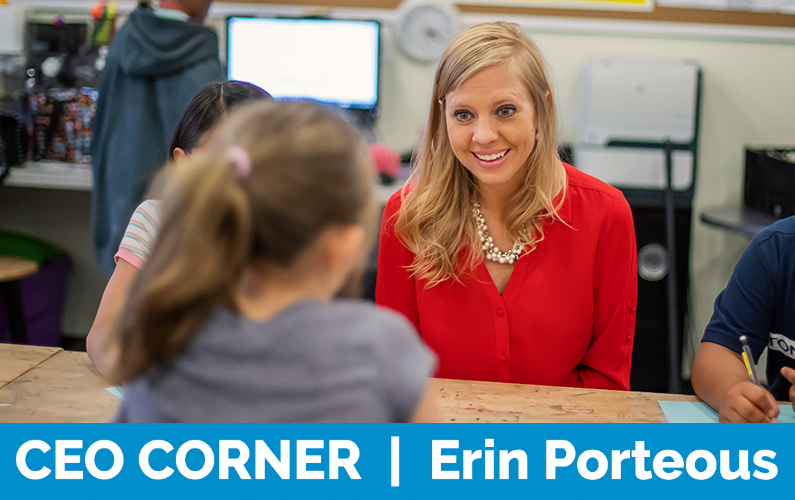By Erin Porteous, CEO
As we prepare to round the corner on the second half of 2020, this young decade is already permanently marked by the unrelenting cruelties at large in the world and the worry that we will ever being safe from them. COVID-19. A weakened economy cast against a rancorous national election. A groundswell of resistance to our country’s long-held tether to racism and inequality. While painful to name them, it is important to recognize that, in many ways, these forces have disconnected people from one another at a time when we need each other most.
By Erin Porteous, CEO
As we prepare to round the corner on the second half of 2020, this young decade is already permanently marked by the unrelenting cruelties at large in the world and the worry that we will ever being safe from them. COVID-19. A weakened economy cast against a rancorous national election. A groundswell of resistance to our country’s long-held tether to racism and inequality. While painful to name them, it is important to recognize that, in many ways, these forces have disconnected people from one another at a time when we need each other most.
And yet, the recent re-opening of our businesses and communities across the country has awakened a cautious optimism that comes with planning for the future. But what is it that drives our collective desire to plan and then plunge fearlessly forward? For some, it’s economic drivers, bottom-line margins and sustainability. For others, it stems from a place of fear, desperation and survivability. For Boys & Girls Clubs of Metro Denver, our drive is the product of unyielding hope and a commitment to connection. And to find seemingly unlimited sources of each, we need look no further than our Clubs.
Using a simple definition of hope as an optimistic state of mind based on an expectation of positive outcomes, we at Boys & Girls Clubs believe that helping kids stay connected to empathy enables them to achieve their greatest potential. I am reminded of a quote by Dr. Brene Brown, who said, “Sympathy drives disconnection. Empathy drives connection. To empathize one must internalize the feelings of another.”
Last fall, one of our Athletic Specialists, Leonardo Ortega, observed teenage Club members gathering in small groups to support one another and assist younger and new Club members. He had the brilliant idea to honor these groups by giving them a name: Barbershop Talks. These groups immediately helped give Club members their own voice to express, vent, encourage, and relate to their fellow friends in a safe environment. Leonardo understands that peer relationships provide a unique context in which children learn a range of critical social emotional skills, such as empathy, cooperation, problem-solving and strategies on how to maneuver through life. On the flip side, he also knows that peer relationships can also contribute negatively to social emotional development through bullying and exclusion. At Boys & Girls Clubs, we guide our kids to create healthy friendships and peer relationships – fostering connection and empathy from a young age.
In two-parent households, 67% of all children have both parents working outside the home. This means that the majority of children are immersed with their peers in daycares, schools, and after school programs from early childhood through adolescence. The average duration of schooling for US children has increased to almost 16 years, extending socialization within school-based peer groups. In addition, with digital connections through social media, potential time with friends can be 24 hours a day, 7 days a week. These trends highlight the importance of peer relationships in children’s lives and decades of research confirm the important and unique role that peer relationships play in children’s development.
Safe connections are an essential part of what keep our older kids coming back to Clubs where they can be themselves. The Club is a place where they can be free from outside pressures beyond their control. In both real and virtual spaces, like Leonardo’s Barbershops, Boys & Girls Clubs cultivate teen role models to help mentor younger Club members, and then incubate the community leaders of tomorrow. So as we build a plan for the future of our organization, we learn from our Club kids while we instruct and guide them. These lessons are especially relevant to us today, with the myriad challenges we face as a city, nation and global community. And it is our Club kids’ courageous acceptance of life on life’s terms and their ability to shape the future – with the tools they acquire through their Club experience – that reminds us of the true power and necessity of connection.

